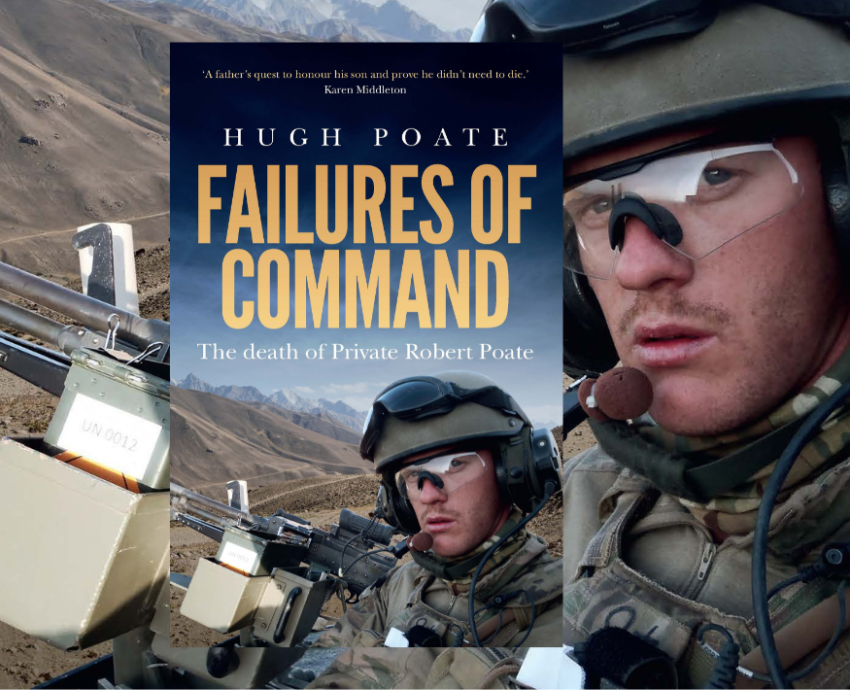
Failures of Command: The Death of Private Robert Poate
By Hugh Poate
Sydney, Newsouth Press, 2021
368pp
Just two months after their deployment to Afghanistan in 2012, Private Robert Poate, Lance Corporal Rick Milosevic, and Sapper James Martin were killed in a “Green on Blue” attack by a Taliban sleeper agent who had infiltrated the Afghan National Army (ANA).
In the aftermath, information provided by rank and file soldiers shocked Poate’s family to the core and led his father Hugh — a former agricultural economist — on a quest to find the truth about his son’s death. Hugh’s 2021 book Failures of Command is the result.
The oldest of two children, Robert grew up in Canberra and on the family’s farm in nearby Gundaroo. He started researching his family’s military history and in February 2009 enlisted in the army, beginning his basic training at Kapooka, near Wagga Wagga.
In his first month of training, Poate, like every other recruit, had his head shaved, was given a uniform and required to obey orders without question, while being constantly yelled at. The recruits’ mobile phones were confiscated and they were not permitted visits from family. This is in contrast to the romantic portrayal of army life portrayed in Australian Defence Force (ADF) propaganda.
While the need for discipline in military situations is understandable, the hierarchical nature of the ADF makes it harder for those lower on the command structure to question decisions and flaws in the leadership structure — leading to greater opportunities for incompetence and leadership failure. These factors led to tragedy for Robert and his comrades in August, 2012.
In a 2015 civilian coronial inquest into their deaths, it was found that senior commanders had hidden, or at best downplayed, an order known as "FRAGO 13" that had been issued by the international force commander General John Allen just 16 days before the fatal attack. The order, which was redacted in copies of the military inquiry officer’s report into the tragedy, specifically warned of the increased risk of “Green on Blue” attacks and the need to upgrade security to mitigate the threat.
Unsatisfied with an internal inquiry where the ADF hierarchy investigates and clears itself, Hugh’s painstaking research and pressure led to the coronial inquest. Despite facing intimidation from the ADF and army hierarchy, the families of the three dead soldiers never strayed from their determination to find the truth and seek justice.
Incredibly, the only officers sanctioned following the inquest were a major, a lieutenant and a sergeant — mainly for failing to enforce dress codes — and all three were later cleared by the then-Chief of Army, Lieutenant General David Morrison.
Despite the Queensland deputy state coroner’s damning findings — which Failures of Command exposes — senior ADF leaders such as Lieutenant General Angus Campbell expressed “confidence in the leadership and actions of the members involved in this tragic incident”.
Another disappointing outcome for the families was the fate of the ANA deserter, known as Hekmatullah. Initially sentenced to death, he instead spent seven years in an Afghan jail. In 2020, as part of the United States-Taliban peace deal — which led to the eventual withdrawal of US and allied forces and the 2021 collapse of the regime — Hekmatullah was among those transported to Qatar and eventually released. His whereabouts is unknown.
That such a deal was negotiated by the Donald Trump administration with the Taliban, without consultation with the 50 nations participating in the 20-year occupation of Afghanistan, shows how little the US cared about the needs of their allies, including Australia.
Despite its damming expose of the flaws and incompetence of institutions such as the ADF, Failures of Command doesn’t question whether Australia should have been involved in the US-led occupation of Afghanistan in the first place. Assumptions in the book that the Afghans should have been grateful for the Australian presence in their country are also problematic, albeit in line with the propaganda supporting Australian involvement in the US-led occupation.
The narrative — which began with the September 11 attacks in the US — that “our valiant soldiers” would help to bring democracy to Afghanistan was also racist.
Moreover, in November 2020, information leaked by whistleblowers led the inspector-general of the ADF to authorise an investigation into Australia’s Special Forces in Afghanistan, from which a heavily redacted report exposed — among many crimes — the murder of 39 Afghans.
As horrible as the Taliban is, such atrocities by occupying forces only led to growing support for their insurgency, in which "Green on Blue" attacks were just one tactic. The success of the Taliban in taking back power in Afghanistan is a damning indictment of the US-led war and Australia’s complicity in this venture. As retired US Marine Corps Major General Smedley Butler put it: “War is a racket. It always has been.”
Ultimately, Failures of Command is a heart-felt account of a father’s search for answers about his son’s death and that of his comrades. Despite its flaws, it exposes how the ADF treated the Afghan people, but also their own soldiers.